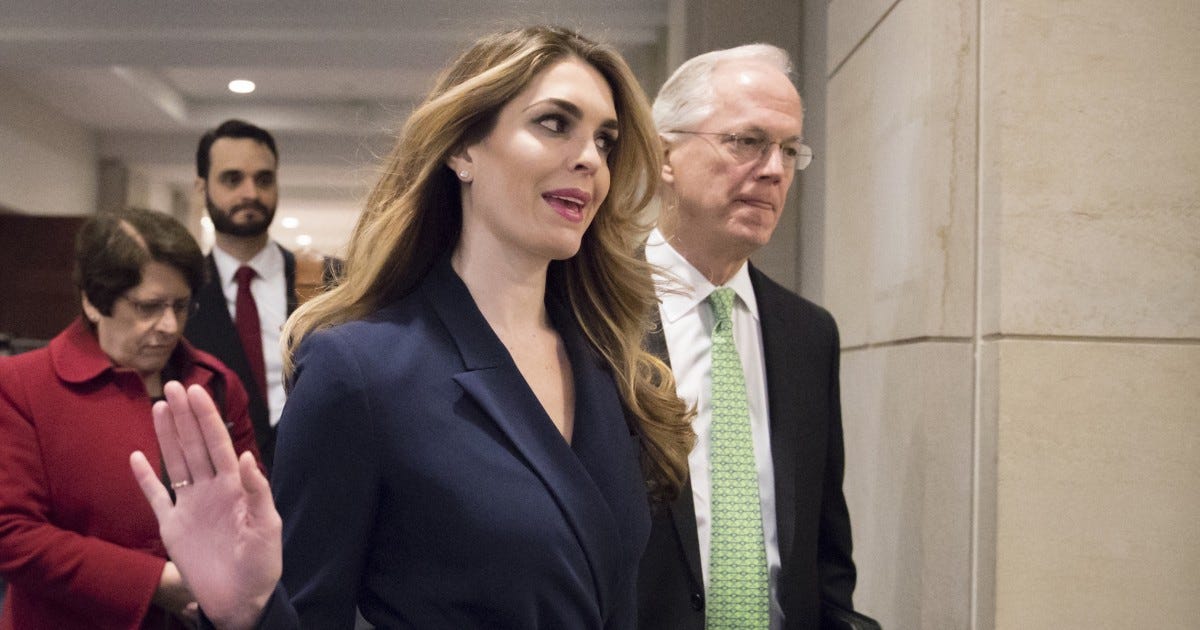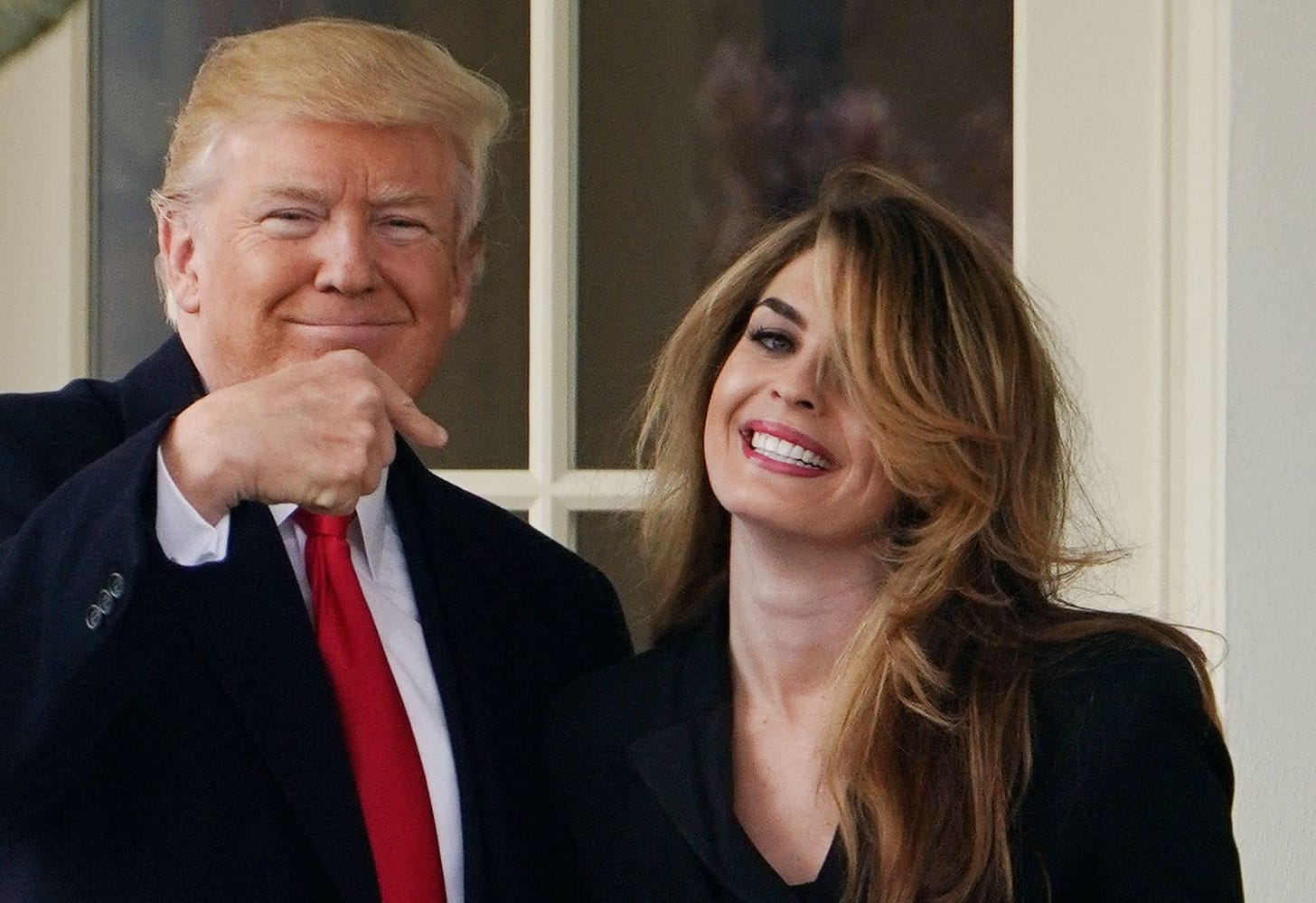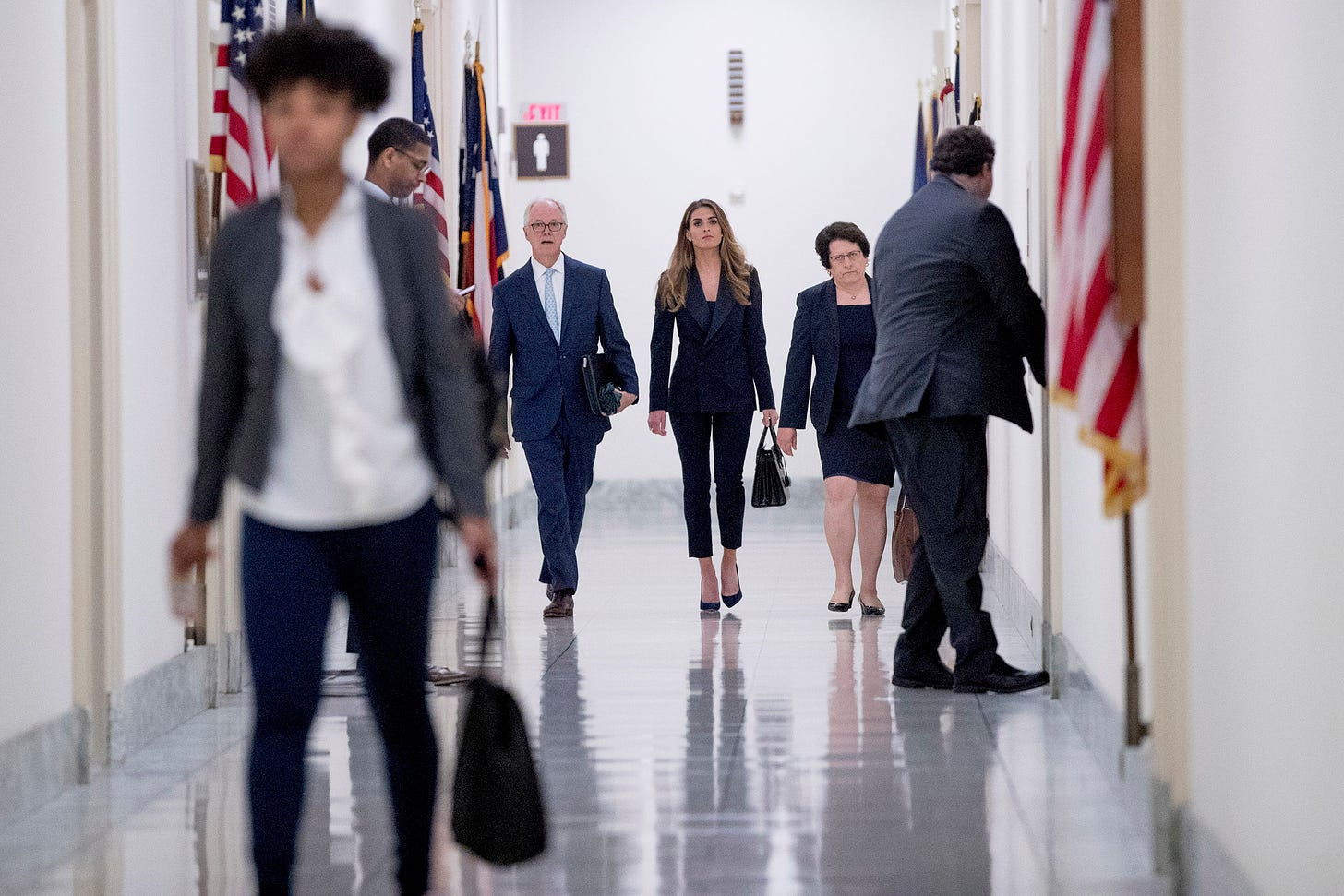Hope Hicks Doesn't Have the Immunity the White House has Directed Her to Invoke

The night before Hope Hicks was set to testify before the House Judiciary Committee behind closed doors, White House Counsel Pat Cipollone sent a letter to the committee chair, Jerry Nadler (D-NY) notifying him that Hicks would not be answering any questions about her time at the White House on the direction of Donald Trump and citing “constitutional immunity.”
“Ms. Hicks is absolutely immune from being compelled to testify before Congress with respect to matters occurring during her service as a senior adviser to the President. Because of this constitutional immunity, and in order to protect the prerogatives of the Office of the President, the President has directed Ms. Hicks not to answer questions before the Committee relating to the time of her service as a senior adviser to the President.” -Pat Cipollone, White House Counsel
Cipollone’s letter cites only Office of Legal Counsel or “OLC” opinions in reaching his conclusion that Hope Hicks is immune from disclosing information to the committee regarding her time at the White House. One of these OLC opinions was only issued by the Justice Department in May, and it was the same justification that Trump used when he instructed former White House Counsel Don McGahn not to testify before the committee after McGahn was subpoenaed.
What is the Office of Legal Counsel
The Office of Legal Counsel is a component of the Department of Justice and is headed up by the Assistant Attorney General to provide legal advice to the President and guidance to all executive branch agencies. The OLC provides its own written opinions and other advice in response to requests from the Counsel to the President. These requests typically deal with complex legal issues where two or more agencies are in disagreement and a resolution is needed. The Office is also responsible for reviewing and commenting on the constitutionality of pending legislation to guide the executive. The OLC essentially acts as outside counsel for the other agencies within the executive branch and reviews all executive orders and substantive proclamations proposed by the President.

Although it’s a well established principle that OLC opinions are binding on all executive branch officials regardless of the legal issue in question, how legally binding these opinions are has been debated for hundreds of years. There is a general acceptance within the legal community that the OLC has the authority to say what the law is for the executive branch, but how far this authority really extends and exactly to whom it extends is not always clear. There is always an inherent conflict of interest issue when a legal entity is headed by a political figure, but never more so now that it is ultimately controlled by Donald Trump.
The president's executive immunity is absolute; the immunity of other federal executive officials is not.
The OLC is subject to a greater degree of political control than other DOJ offices because it is controlled by the attorney general, who is a political appointee of the President. All OLC deputies are also politically appointed which means greater risk for politically motivated decisions that may not always provide impartial constitutional analysis, especially if there is a conflict with the orders of the President. This problem has always existed, but seems especially exaggerated under Trump who is well known for getting rid of anyone who disagrees with him, including past attorney generals. OLC opinions are not always guided in the text, history or intention of the Constitution, but rather balanced against the president’s interests “as the sole head of the executive branch.” Sometimes the OLC is not as concerned with accuracy or fairness as much as creating a legally justified path that aligns with the President’s needs and “almost always concludes that the president can do what he wants.”
The letter that Cipollone just sent to Nadler, that claims the Constitution provides Hope Hicks with immunity is not citing the Constitution directly, or any law interpreting this type of immunity that stems from the Constitution. It only cites OLC opinions, that are created to favor Trump under the guise of lending his policy some legal credibility that may or may not exist.

What is Executive Immunity
Executive immunity is granted to officers of the executive branch to shield them from personal liability for tortious acts or omissions done while carrying out their duties. The president's executive immunity is absolute; the immunity of other federal executive officials is not. Executive immunity is often interchangeable with “executive privilege” which is not expressly discussed in the U.S. Constitution, but has been deemed an implied power based on the separation of powers laid out in Article II.
The president has a presumed right to privacy in his communications, but Cabinet officials and senior advisers do not - executive officials cannot invoke executive privilege on the president’s behalf. The courts have also been clear that even the president’s privileges are limited in scope, especially when Congress and subpoenas are involved. Executive Privilege can also be divided into two categories: presidential communications privilege and deliberative process privilege. Presidential communications have a presumptive privilege due to “fundamental to the operation of Government and inextricably rooted in the separation of powers under the Constitution” and the need for the President to have broad latitude in order to carry out her duties effectively.
White House Counsel is now relying on Office of Legal Counsel opinions and claiming the application of them in this way are persuasive when legal precedent says otherwise.
The second type of privilege, often called deliberative process privilege, is based on a common-law finding that government officials should be free to privately deliberate before deciding on a particular course of action. It can be applied more broadly to cover more, but is much more limited in scope especially when there are allegations of misconduct by high-level officials. Executive Privilege is diminished, usually in the courts, by providing detailed and exact proof of the need overcome confidentiality default. Essentially, the ruling in United States v. Nixon determined that not all subpoenas and inquiries can be quashed on the basis of executive privilege when “the fair administration of criminal justice” outweighs the president’s right to confidentiality in communications.
Hope Hicks is not the President and is therefore not permitted the highest level of executive privilege or immunity from Congressional oversight. Her status as a high level official within the Trump Administration means that she enjoys some protections, but those protections are limited. The president himself would be limited in his power and forced to comply if the a challenger had just cause to show why the privilege should be denied in the courts. White House Counsel is now relying on Office of Legal Counsel opinions and claiming the application of them in this way are persuasive when legal precedent says otherwise. If this issue were before the courts today, Hicks and others in the Trump Administration would be compelled to comply with the Congressional subpoenas once Congress provided focused, detailed evidence proving the need to overcome executive privilege. Given the challenges Democrats in Congress are bringing now in the courts, it’s likely that this has already been seen as the fall-back position for getting compliance and this is likely where Congress is headed if they don’t get the cooperation they are looking for today.
For more on the historical context of Executive Privilege, click here.
Amee Vanderpool writes the “Shero and a Scholar” Newsletter and is an attorney, contributor to Playboy Magazine, analyst for BBC radio and Director of The Inanna Project. She can be reached at avanderpool@gmail.com or follow her on Twitter @girlsreallyrule.



